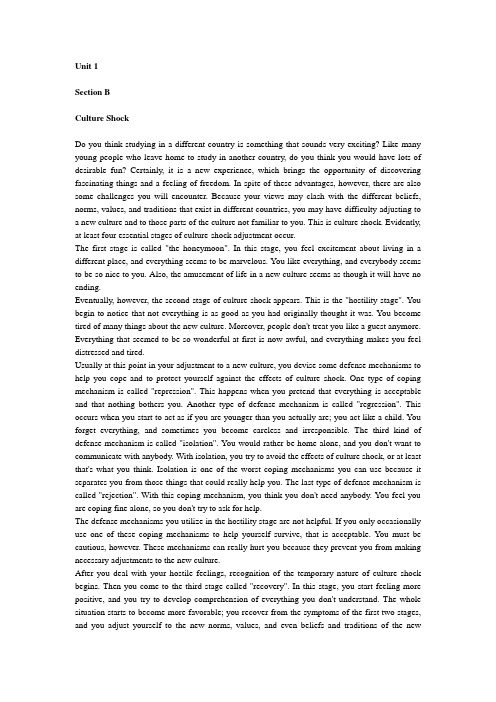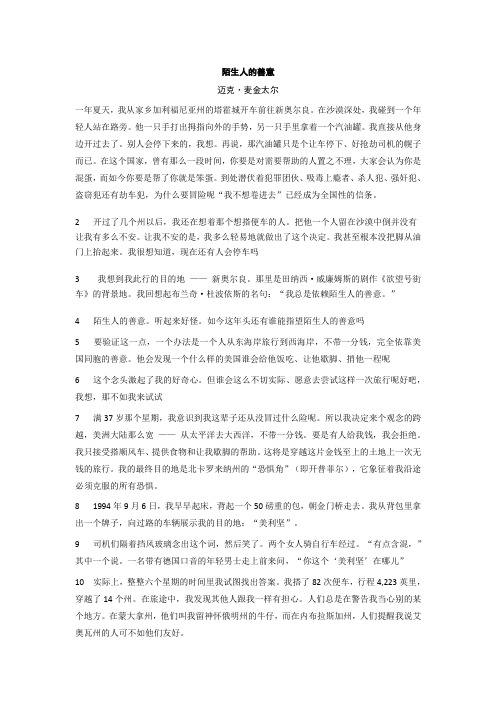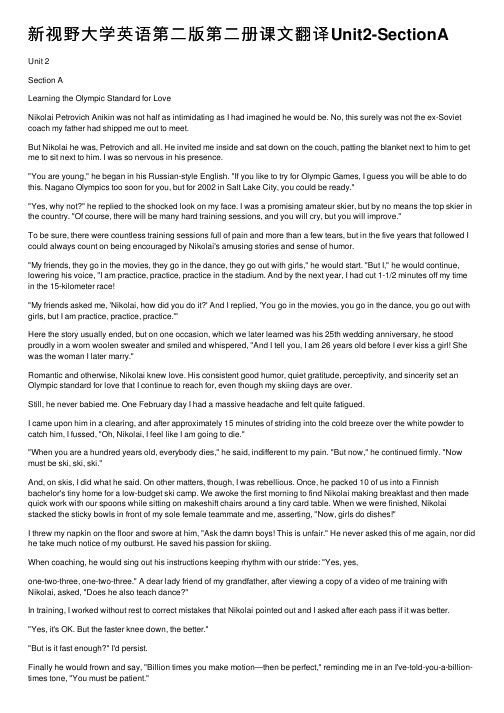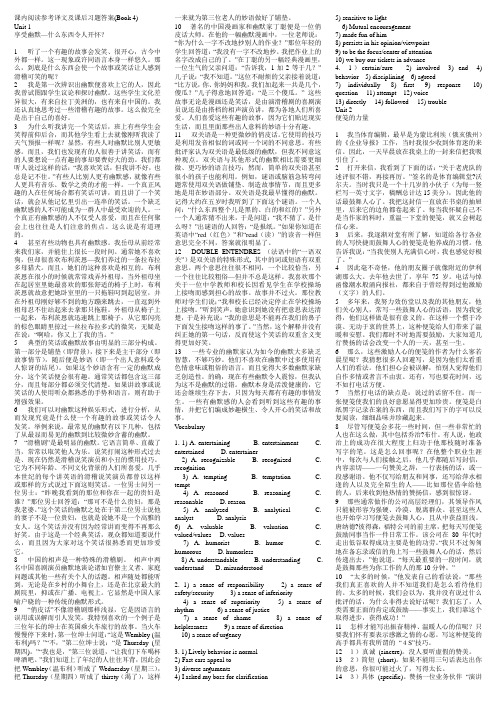Unit 1 Love新编大学英语第二版第二册课文翻译
新视野大学英语第二版第二册课文翻译 Unit 1-Section B

Unit 1Section BCulture ShockDo you think studying in a different country is something that sounds very exciting? Like many young people who leave home to study in another country, do you think you would have lots of desirable fun? Certainly, it is a new experience, which brings the opportunity of discovering fascinating things and a feeling of freedom. In spite of these advantages, however, there are also some challenges you will encounter. Because your views may clash with the different beliefs, norms, values, and traditions that exist in different countries, you may have difficulty adjusting to a new culture and to those parts of the culture not familiar to you. This is culture shock. Evidently, at least four essential stages of culture-shock adjustment occur.The first stage is called "the honeymoon". In this stage, you feel excitement about living in a different place, and everything seems to be marvelous. You like everything, and everybody seems to be so nice to you. Also, the amusement of life in a new culture seems as though it will have no ending.Eventually, however, the second stage of culture shock appears. This is the "hostility stage". You begin to notice that not everything is as good as you had originally thought it was. You become tired of many things about the new culture. Moreover, people don't treat you like a guest anymore. Everything that seemed to be so wonderful at first is now awful, and everything makes you feel distressed and tired.Usually at this point in your adjustment to a new culture, you devise some defense mechanisms to help you cope and to protect yourself against the effects of culture shock. One type of coping mechanism is called "repression". This happens when you pretend that everything is acceptable and that nothing bothers you. Another type of defense mechanism is called "regression". This occurs when you start to act as if you are younger than you actually are; you act like a child. You forget everything, and sometimes you become careless and irresponsible. The third kind of defense mechanism is called "isolation". You would rather be home alone, and you don't want to communicate with anybody. With isolation, you try to avoid the effects of culture shock, or at least that's what you think. Isolation is one of the worst coping mechanisms you can use because it separates you from those things that could really help you. The last type of defense mechanism is called "rejection". With this coping mechanism, you think you don't need anybody. You feel you are coping fine alone, so you don't try to ask for help.The defense mechanisms you utilize in the hostility stage are not helpful. If you only occasionally use one of these coping mechanisms to help yourself survive, that is acceptable. You must be cautious, however. These mechanisms can really hurt you because they prevent you from making necessary adjustments to the new culture.After you deal with your hostile feelings, recognition of the temporary nature of culture shock begins. Then you come to the third stage called "recovery". In this stage, you start feeling more positive, and you try to develop comprehension of everything you don't understand. The whole situation starts to become more favorable; you recover from the symptoms of the first two stages, and you adjust yourself to the new norms, values, and even beliefs and traditions of the newcountry. You begin to see that even though the distinctions of the culture are different from your own, it has elements that you can learn to appreciate.The last stage of culture shock is called "adjustment". In this stage, you have reached a point where you actually feel good because you have learned enough to understand the new culture. The things that initially made you feel uncomfortable or strange are now things that you understand. This acquisition of understanding alleviates much of the stress. Now you feel comfortable; you have adjusted to the new culture.Evidently, culture shock is something you cannot avoid when living in a foreign country. It does not seem like a very helpful experience when you are going through its four stages. However, when you have completely adjusted to a new culture you can more fully enjoy it. You learn how to interact with other people, and you learn a considerable amount about life in a culture that is not your own. Furthermore, learning about other cultures and how to adjust to the shock of living in them helps you learn more about yourself.Words: 753。
新编大学英语视听说教程unit1文本

Part tweListening1Love story*Where do I begin to tell the story of how great love can be,The sweet love story that is older than the sea,The simple truth about the love she brings to me?Where do I start?With her first hello, she gave a meaning to this empty world of mine.There'll never be another love another time.She came into my life and made the living fine.She fills my heart, she fills my heart,With very special things, with angel's songs, with wild imaginings.She fills my soul with so much love,That anywhere I go, I'm never lonelyWith her along, who could be lonely?I reach for her hand, it's always there.(Repeat the part marked with “*”.)How long does it last?Can love be measured by the hours in a day?I have no answers now but this much I can say.I know I need her till the stars all burn away,And she'll be there.Listening2Traditionally the heart is the part of the body where emotions come from. If you are a warm-hearted person, for example, you are kind and thoughtful towards others. If you have a heart of gold, you are a very generous person. But if you are heartless, you are cruel and unfeeling.Of all the emotions, it is love that is the most associated with the heart. In love songs, all over the world, love almost always goes together with the heart. As the song from Titanic says, “You are here in my heart and my heart will go on and on. Love can touch us one time and last for a lifetime, and never let go till we're gone.” Perhaps the role of the heart in love comes from what happens to it when you feel really attracted to someone. The strong feelings of attraction make your breathing speed up and your heart beat faster.Listening3In past generations, the challenge of dating was different. Men and women wanted a partner who could fulfill their basic needs for security and survival. Women lookedfor a strong man who would be a good bread-winner; men searched for a nurturing woman to make a home. This practice that worked for thousands of years has suddenly changed.The new challenge of dating is to find a partner who not only will be supportive of our physical needs for survival and security but will support our emotional and spiritual needs. Today we want more from our relationships. Millions of men and women around the world are searching for a soul mate to experience lasting love, happiness, and romance.It is no longer enough to just find someone who is willing to marry us, and we want partners who will love us more as they get to know us: We want to live happily ever after. To find and recognize partners who can fulfill our new needs for increased closeness, good communication, and a great love life, we need to update our dating skills.Part threePractice oneA Mother's LoveYou can see it in her eyes— in her gaze and in her sighs. It is a mother's love.You can feel it in her touch— in her tender hugs and such. It is a mother's love. You can hear it in her words—in her praises and bywords.It is a mother's love.She cares. She understands.She lends an ear and holds our hands. She gives us a mother's love.Practive twoTalk to kidsMy son's primary school celebrates Valentine's Day in a wonderful way. Each day throughout the month of February, the school honors each student in informalceremonies. At the ceremony, classmates, teachers and parents get together todeliver compliments to that particular child. They believe that a child's emotionaland social skills should be developed alongside their intellectual skills. Learning to acknowledge qualities and strengths in others—and receiving that acknowledgment gracefully—is a very important learning lesson.I know I compliment my son frequently, and certainly try to make sure he knows heis loved. But I realize that I have never actually pointed out, one by one, specificqualities that make him unique and so special to me. And how infrequently we reallypoint out what is special in others. Sure, we say “I love you” or “thanks” regularly,but when do we take the opportunity to really and truly examine what makes aperson special? What is unique and different about them?This year, the time was scheduled for my son to receive more than 40 complimentsfrom his peers, teachers, parents, and himself. Each child had their day at the centerof the circle, their friends coming up one by one to give a gift of powerful words.This year, my son heard that his thoughtfulness was appreciated, his ideasimportant, his expressions inspiring. He was also expected to write and deliver a compliment to each of his classmates.Practice threeTalk to kidsIn the end, I had to ask my husband to read my Valentine compliment to our son. Iwas simply crying too hard to get the words out. Witnessing the tenderness ofschool-age children saying what they thought was special about my little boyproved too much for me. But I was not alone. When I warned my son I might getemotional, he said, “That's OK. Lots of parents cry.” He was right.This is what my husband read to our son on my behalf:Dear Cole:Your love of language and information has always amazed me. I love learning fromyou and with you. I admire how new words are so easily incorporated into yourvocabulary. I think you are fresh and eager and loving.I admire that relationships are important to you. I like to listen to the connectionsyou make with past experiences. I think you are good at remembering.I love how you are proud of yourself when you try something new. I feel proud, too.I like how your whole body tells a story, and your expressions make me feel good.I am proud of your willingness to express your fears and appreciate the reminderthat you will grow at the pace that suits you best. I love your jokes and yourfondness for telling them over and over—so I will laugh. I think you are fun to bewith.I love that you are my son.I am really grateful to this school for creating a learning environment. Theseexercises benefit the parents as well as the kids. That, to me, is a Valentine worthgiving.Practice fourMy familyI grew up in a family with six sisters. In my lifetime I have seen all of them abusedby various men in their lives. Even my mother has the scars from two unsuccessfulmarriages.When I was a teenager, my mother shared some insights into all of their failedrelationships. She explained that they really weren't expecting to be treated asqueens, but they did desire two things from the men in their lives: to be toldfrequently that they are loved and to be shown often that they are special. It was atthat point that I decided I would be the sort of husband my mom and sisters haddreamed of but never had.When I was dating my wife-to-be I remembered those two points my mothershared with me years earlier. I admit that I struggled trying to be able to express mylove in words and in action. For most men, it isn't natural for us to be romantics. Butthen again, it isn't natural for us to be millionaires or sports superstars. It does takeeffort, practice and diligence. But the rewards are there.Now we've been married for nine years. I really, truly, deeply love my wife and lether know it every day by what I say and what I do. Our friends and family membersall admire us and want to know our secret.Part fourSection 1Good old daysLife was very different in the 1950s than it is today. Divorce was not common. Husbands went out to work to support the whole family. Most women didn't workand depended on their husbands' incomes for living. Children didn't come homeafter school to an empty house as many do today. Families did more things together.One of the favorite family pastimes was a drive in the country. Gas was cheap.People had big cars, and the whole family could ride comfortably. Before TVbecame popular, people talked to each other more. Children didn't have as manytoys, and they played more games together. On Saturdays the neighborhoodtheaters had special movies for children. The shows cost only 25 cents. People stayed at one job for most of their lives. They didn't change jobs every yearlike they do today. They also lived in the same house for a long time. They didn'tmove as much.Services were better in the 1950s. Doctors often came to a sick person's house, especially if you were “sick in bed”. Milkmen delivered fresh dairy products daily to homes. There were no self-service gas stations, and attendants used to wash yourcar windows and check your oil free of charge.Scetion 2East Meets West and Loves ItHisham and I will have been married for twenty years this February. Everybodysaid it would not work. He is Jordanian, Muslim, and I am Italian, Catholic. We met in Florida twenty-two years ago. What we had in common was nothing except youth.He could barely speak the English language, and I thought Arabs were from India. Within a year I found out where J ordan was exactly and he could say “I love you” in broken English.When we got married people actually placed bets at our small wedding in myfamily's dining room. They thought our relationship would not last a year. Hishamdid not tell his parents he was married for almost five years. He felt that if he failedat school his family would blame the marriage. Of course everybody, from Arabs to Americans, thought he married me to get a green card. I knew he didn't.I lived in his country for six years after graduation and had a son there. Through Hisham's eyes I saw the beauty of his culture and religion and the simple ways of his people. Being from New York and living in Amman, Jordan, I still had my Christmastree each year, my Easter eggs and even a Halloween pumpkin in the window. I alsotook some of their ways—cooking, methods of mothering, socializing—and it enhanced my own character in the long run.Throughout the years, I was not the Italian girl from New York, not the Americanmarried to the Arab; I was a beautiful blended person with two children and a manwho loves me.Section IIILove Y ou and Love Y our WeaknessA man had two large pots for carrying water. One pot had a crack in it, while theother was perfect. At the end of the long walk from the stream to his house, thecracked pot arrived only half full. For two years the man had been delivering onlyone and a half pots full of water everyday to his house. Of course, the perfect potwas proud of itself. And the cracked pot felt ashamed and miserable because it wasable to do only half of the work. After two years of failure, it spoke to the man oneday.“I am ashamed of myself, and I want to apologize to you. I have been able to deliveronly half my load because of this crack in my side,” t he pot said. The man felt sorry for it and said, “As we return to the house, I want you to look at the beautiful flowersalong the path.” Indeed, as they went up the hill, the cracked pot saw the sunwarming the beautiful flowers on the side of the path. But it still felt bad becausehalf of the water had run away, and again it apologized.Then the man said to the pot, “Did you see that there were flowers only on yourside of the path, but not on the other pot's side? That's because I have alwaysknown about you and planted flower seeds on your side of the path, and every dayyou've watered them. For two years I have been able to pick these beautiful flowersto decorate the house. Without you, the house would not look so beautiful.”。
大学英语泛读教程2【第二版】unit1课文翻译

several nights a week Joseph woke up screaming from the same terrible could never recall his whole dream, only remembered that someone was running after was trying to get away,but in his dream he could not move。
he continued having this nightmare for months。
he was so tired in the morning that it was hard for him to go to work。
Joseph,you see,is not a frightened child,but a grown man。
Milton Kramer is a psychiatrist and dream researcher Cincinnati, believes that it is very important that people don't ignore their dreams,because they are messages from our sleeping Kramer studied dreams and dreamers,he found that people wake up feeling very discouraged after they have a bad also found that after having a good dream,people feel more ,dreams can have harmful or beneficial a result,Kramer believes that we need to learn how to change our bad we understand what happened in our dreams,we can change negative,hurtful dreams to positive,helpful ones。
新世纪英语综合教程第二版第二册课后翻译unit1~unit10

新世纪英语综合教程第二版第二册课后翻译unit1~unit10UNIT 11.那部关于古代战争的电影采用了先进技术,令观众仿佛身临其境。
(illusion)Thanks to modern technology, the film about that ancient battle gives the audience the illusion of being on the battlefield themselves.2. 在那场大火中,整个古城毁于一旦,但是这块石碑却幸运地保存下来。
(devastate)That ancient city was devastated by the fire, but fortunately the stone tablet survived.3. 他们看了那段录像,听了那位妇女的讲述,心里充满了对那位地震孤儿的同情。
The videotape and the story by the woman filled them with sympathy for the child who had become an orphan in the earthquake.4.那场大地震中,我们听到太多太多教师的事迹,他们拒绝离开学生自己逃生,献出了自己的生命。
(leave behind)In that earthquake, we heard many stories of teachers who had refused to leave their students behind and laid down their lives.4.豫园的建造始于1558年,但由于资金短缺时建时停,1578年才建成。
(off and on)The construction of Yu Y uan Garden began in 1558, but it was completed until 1578 because building went of and on for lack of money.6. 1980年我遇到她时,她刚从国外读完硕士回来。
新世纪大学英语(第二版)综合课程2unit1课文翻译和课后答案

陌生人的善意迈克·麦金太尔一年夏天,我从家乡加利福尼亚州的塔霍城开车前往新奥尔良。
在沙漠深处,我碰到一个年轻人站在路旁。
他一只手打出拇指向外的手势,另一只手里拿着一个汽油罐。
我直接从他身边开过去了。
别人会停下来的,我想。
再说,那汽油罐只是个让车停下、好抢劫司机的幌子而已。
在这个国家,曾有那么一段时间,你要是对需要帮助的人置之不理,大家会认为你是混蛋,而如今你要是帮了你就是笨蛋。
到处潜伏着犯罪团伙、吸毒上瘾者、杀人犯、强奸犯、盗窃犯还有劫车犯,为什么要冒险呢“我不想卷进去”已经成为全国性的信条。
2 开过了几个州以后,我还在想着那个想搭便车的人。
把他一个人留在沙漠中倒并没有让我有多么不安。
让我不安的是,我多么轻易地就做出了这个决定。
我甚至根本没把脚从油门上抬起来。
我很想知道,现在还有人会停车吗3 我想到我此行的目的地——新奥尔良。
那里是田纳西·威廉姆斯的剧作《欲望号街车》的背景地。
我回想起布兰奇·杜波依斯的名句:“我总是依赖陌生人的善意。
”4 陌生人的善意。
听起来好怪。
如今这年头还有谁能指望陌生人的善意吗5 要验证这一点,一个办法是一个人从东海岸旅行到西海岸,不带一分钱,完全依靠美国同胞的善意。
他会发现一个什么样的美国谁会给他饭吃、让他歇脚、捎他一程呢6 这个念头激起了我的好奇心。
但谁会这么不切实际、愿意去尝试这样一次旅行呢好吧,我想,那不如我来试试7 满37岁那个星期,我意识到我这辈子还从没冒过什么险呢。
所以我决定来个观念的跨越,美洲大陆那么宽——从太平洋去大西洋,不带一分钱。
要是有人给我钱,我会拒绝。
我只接受搭顺风车、提供食物和让我歇脚的帮助。
这将是穿越这片金钱至上的土地上一次无钱的旅行。
我的最终目的地是北卡罗来纳州的“恐惧角”(即开普菲尔),它象征着我沿途必须克服的所有恐惧。
8 1994年9月6日,我早早起床,背起一个50磅重的包,朝金门桥走去。
我从背包里拿出一个牌子,向过路的车辆展示我的目的地:“美利坚”。
新视野大学英语第二版第二册课文翻译Unit2-SectionA

新视野⼤学英语第⼆版第⼆册课⽂翻译Unit2-SectionAUnit 2Section ALearning the Olympic Standard for LoveNikolai Petrovich Anikin was not half as intimidating as I had imagined he would be. No, this surely was not the ex-Soviet coach my father had shipped me out to meet.But Nikolai he was, Petrovich and all. He invited me inside and sat down on the couch, patting the blanket next to him to get me to sit next to him. I was so nervous in his presence."You are young," he began in his Russian-style English. "If you like to try for Olympic Games, I guess you will be able to do this. Nagano Olympics too soon for you, but for 2002 in Salt Lake City, you could be ready.""Yes, why not?" he replied to the shocked look on my face. I was a promising amateur skier, but by no means the top skier in the country. "Of course, there will be many hard training sessions, and you will cry, but you will improve."To be sure, there were countless training sessions full of pain and more than a few tears, but in the five years that followed I could always count on being encouraged by Nikolai's amusing stories and sense of humor."My friends, they go in the movies, they go in the dance, they go out with girls," he would start. "But I," he would continue, lowering his voice, "I am practice, practice, practice in the stadium. And by the next year, I had cut 1-1/2 minutes off my time in the 15-kilometer race!"My friends asked me, 'Nikolai, how did you do it?' And I replied, 'You go in the movies, you go in the dance, you go out with girls, but I am practice, practice, practice.'"Here the story usually ended, but on one occasion, which we later learned was his 25th wedding anniversary, he stood proudly in a worn woolen sweater and smiled and whispered, "And I tell you, I am 26 years old before I ever kiss a girl! She was the woman I later marry."Romantic and otherwise, Nikolai knew love. His consistent good humor, quiet gratitude, perceptivity, and sincerity set an Olympic standard for love that I continue to reach for, even though my skiing days are over.Still, he never babied me. One February day I had a massive headache and felt quite fatigued.I came upon him in a clearing, and after approximately 15 minutes of striding into the cold breeze over the white powder to catch him, I fussed, "Oh, Nikolai, I feel like I am going to die.""When you are a hundred years old, everybody dies," he said, indifferent to my pain. "But now," he continued firmly. "Now must be ski, ski, ski."And, on skis, I did what he said. On other matters, though, I was rebellious. Once, he packed 10 of us into a Finnish bachelor's tiny home for a low-budget ski camp. We awoke the first morning to find Nikolai making breakfast and then made quick work with our spoons while sitting on makeshift chairs around a tiny card table. When we were finished, Nikolai stacked the sticky bowls in front of my sole female teammate and me, asserting, "Now, girls do dishes!"I threw my napkin on the floor and swore at him, "Ask the damn boys! This is unfair." He never asked this of me again, nor did he take much notice of my outburst. He saved his passion for skiing.When coaching, he would sing out his instructions keeping rhythm with our stride: "Yes, yes,one-two-three, one-two-three." A dear lady friend of my grandfather, after viewing a copy of a video of me training with Nikolai, asked, "Does he also teach dance?"In training, I worked without rest to correct mistakes that Nikolai pointed out and I asked after each pass if it was better. "Yes, it's OK. But the faster knee down, the better.""But is it fast enough?" I'd persist.Finally he would frown and say, "Billion times you make motion—then be perfect," reminding me in an I've-told-you-a-billion-times tone, "You must be patient."Nikolai's patience and my hard work earned me a fourth-place national ranking heading into the pre-Olympic season, but then I missed the cut for the 2002 Olympics.Last summer, I returned to visit Nikolai. He made me tea... and did the dishes! We talked while sitting on his couch. Missing the Olympic Team the previous year had made me pause and reflect on what I had gained—not the least of which was a quiet, indissoluble bond with a short man in a tropical shirt.Nikolai taught me to have the courage, heart, and discipline to persist, even if it takes a billion tries. He taught me to be thankful in advance for a century of life on earth, and to remind myself every day that despite the challenges at hand, "Now must be love, love, love." (Words: 822)。
全新版大学英语(第二版)综合教程2课文及翻译

全新版大学英语(第二版)综合教程2课文及翻译哎呀,你看这道题目,简直就是让人头疼啊!不过,别担心,我这个“英语大神”可不会让你失望的。
今天,我们就要一起来聊聊全新版大学英语(第二版)综合教程2课文及翻译。
让我们来看看这本教材的封面吧。
哇塞,这是什么鬼?一只穿着西装的猫?这也太搞笑了吧!不过,说实话,这本书的内容还是非常不错的。
它包含了各种各样的话题,从生活到科技,从文化到历史,应有尽有。
而且,每个话题都有详细的讲解和生动的例子,让我们在轻松愉快的阅读中提高英语水平。
我们来看看这本书的目录。
哇哦,这个目录真是太丰富了!有这么多章节,我们要学习的东西简直太多了。
不过,没关系,只要我们认真学习,一定能够掌握这些知识的。
现在,让我们开始正式的学习吧!我们来学习一下这本书的第一课。
这一课的主题是“家庭”,里面讲述了很多关于家庭成员和家庭生活的内容。
比如说,我们可以学到如何用英语表达“爸爸”、“妈妈”、“哥哥”、“姐姐”等词汇;还可以通过一些例子了解不同家庭的文化差异。
这一课让我们对家庭有了更深入的了解。
我们来学习一下这本书的第二课。
这一课的主题是“友谊”,里面讲述了很多关于朋友和人际关系的内容。
比如说,我们可以学到如何用英语表达“朋友”、“好朋友”、“交朋友”等词汇;还可以通过一些例子了解如何处理人际关系中的冲突和矛盾。
这一课让我们学会了如何与人相处。
我们来学习一下这本书的第三课。
这一课的主题是“爱情”,里面讲述了很多关于恋爱和婚姻的内容。
比如说,我们可以学到如何用英语表达“男朋友”、“女朋友”、“结婚”等词汇;还可以通过一些例子了解不同文化的婚礼习俗。
这一课让我们对爱情有了更深入的认识。
以上就是我对全新版大学英语(第二版)综合教程2课文及翻译的一些简单介绍。
希望对你有所帮助吧!不过,记住哦,学好英语最重要的还是要多读、多听、多说、多写。
只有这样,才能真正掌握这门语言。
加油吧!。
新编大学英语4(第二版)Unit 1-Unit 6单元 课文翻译及课后答案详解

课内阅读参考译文及课后习题答案(Book 4)Unit 1享受幽默—什么东西令人开怀?1 听了一个有趣的故事会发笑、很开心,古今中外都一样。
这一现象或许同语言本身一样悠久。
那么,到底是什么东西会使一个故事或笑话让人感到滑稽可笑的呢?2 我是第一次辨识出幽默便喜欢上它的人,因此我曾试图跟学生议论和探讨幽默。
这些学生文化差异很大,有来自拉丁美洲的,也有来自中国的。
我还认真地思考过一些滑稽有趣的故事。
这么做完全是出于自己的喜好。
3 为什么听我讲完一个笑话后,班上有些学生会笑得前仰后合,而其他学生看上去就像刚听我读了天气预报一样呢?显然,有些人对幽默比别人更敏感。
而且,我们也发现有的人很善于讲笑话,而有的人要想说一点有趣的事却要费好大的劲。
我们都听人说过这样的话:―我喜欢笑话,但我讲不好,也总是记不住。
‖有些人比别人更有幽默感,就像有些人更具有音乐、数学之类的才能一样。
一个真正风趣的人在任何场合都有笑话可讲,而且讲了一个笑话,就会从他记忆里引出一连串的笑话。
一个缺乏幽默感的人不可能成为一群人中最受欢迎的人。
一个真正有幽默感的人不仅受人喜爱,而且在任何聚会上也往往是人们注意的焦点。
这么说是有道理的。
4 甚至有些动物也具有幽默感。
我岳母从前经常来我们家,并能住上很长一段时间。
通常她不喜欢狗,但却很喜欢布利茨恩—我们养过的一条拉布拉多母猎犬。
而且,她们的这种喜欢是相互的。
布利茨恩在很小的时候就常常戏弄外祖母,当外祖母坐在起居室里她最喜欢的那张舒适的椅子上时,布利茨恩就故意把她卧室里的一只拖鞋叼到起居室,并在外祖母刚好够不到的地方蹦来跳去,一直逗到外祖母忍不住站起来去拿那只拖鞋。
外祖母从椅子上一起来,布利茨恩就迅速跳上那椅子,从它那闪亮的棕色眼睛里掠过一丝拉布拉多式的微笑,无疑是在说:―啊哈,你又上了我的当。
‖5 典型的笑话或幽默故事由明显的三部分构成。
第一部分是铺垫(即背景),接下来是主干部分(即故事情节),随后便是妙语(即一个出人意料或令人惊讶的结尾)。
- 1、下载文档前请自行甄别文档内容的完整性,平台不提供额外的编辑、内容补充、找答案等附加服务。
- 2、"仅部分预览"的文档,不可在线预览部分如存在完整性等问题,可反馈申请退款(可完整预览的文档不适用该条件!)。
- 3、如文档侵犯您的权益,请联系客服反馈,我们会尽快为您处理(人工客服工作时间:9:00-18:30)。
Unit 1 LoveA Good Heart to Lean OnAugustus J. BullockMore than I realized, Dad has helped me keep my balance.[1] When I was growing up, I was embarrassed to be seen with my father. He was severely crippled and very short, and when we would walk together, his hand on my arm for balance, people would stare. I would be ashamed of the unwanted attention. If he ever noticed or was bothered, he never let on.[2] It was difficult to coordinate our steps—his halting, mine impatient—and because of that, we did n't say much as we went along. But as we started out, he always said, “You set the pace. I will try to adjust to you. ”[3] Our usual walk was to or from the subway, which was how he got to work. He went to work sick, and despite nasty weather. He almost never missed a day, and would make it to the office even if others could not. It was a matter of pride for him.[4] When snow or ice was on the ground, it was impossible for him to walk, even with help. At such times my sisters or I would pull him through the streets of Brooklyn , N.Y. , on a child's sleigh to the subway entrance. Once there, he would cling to the handrail until he reached the lower steps that the warmer tunnel air kept ice-free. In Manhattan the subway station was the basement of his office building, and he would not have to go outside again until we met him in Brooklyn on his way home.[5] When I think of it now, I marvel at how much courage it must have taken for a grown man to subject himself to such indignity and stress. And I marvel at how he did it—without bitterness or complaint.[6] He never talked about himself as an object of pity, nor did he show any envy of the more fortunate or able. What he looked for in others was a “good heart”, and if he found one, the owner was good enough for him.[7] Now that I am older, I believe that is a proper standard by which to judge people, even though I still don't know precisely what a “good heart” is. But I know the times I don't have one myself.[8] Unable to engage in many activities, my father still tried to participate in some way. When a local baseball team found itself without a manager, he kept it going. He was a knowledgeable baseball fan and often took me to Ebbets Field to see the Brooklyn Dodgers play. He liked to go to dances and parties, where he could have a good time just sitting and watching.[9] On one memorable occasion a fight broke out at a beach party, with everyone punching and shoving. He wasn't content to sit and watch, but he couldn't stand unaided on the soft sand. In frustration he began to shout, “I'll fight anyone who will sit down with me! I'll fight anyone who will sit down with me! ”[10] Nobody did. But the next day people kidded him by saying it was the first time any fighter was urged to take a dive even before the bout began.[11] I now know he participated in some things vicariously through me, his only son. When I played ball (poorly), he “played” too. When I joined the Navy, he “joined” too. And when I came home on leave, he saw to it that I visited his office. Introducing me, he was really saying, “This is my son, but it is also me, and I could have done this, too, if things had been different. ” Those words were never said aloud.[12] He has been gone many years now, but I think of him often. I wonder if he sensed my reluctance to be seen with him during our walks. If he did, I am sorry I never told him how sorry I was, how unworthy I was, how I regretted it. I think of him when I complain about trifles, when I am envious of another's good fortune, when I don't have a “good heart”.[13] At such times I put my hand on his arm to regain my balance, and say, “You set the pace. I will try to adjust to you.”善良之心,久久相依当时我没有意识到,是爸爸帮我保持平衡奥古斯塔斯∙ J ∙布洛克1 随着我渐渐长大,当别人看见我和爸爸在一起,我会觉得很尴尬。
他身材矮小,走起路来跛得很厉害。
我们一起走时,他要把手搭在我的肩上才能保持平衡,人们就会盯着我们看。
对这种不必要的注意我觉得非常难堪。
他也许曾注意到,或着觉得烦恼,但他从来没有流露出来。
2 要协调我们的步伐并不容易,他(的步子)一瘸一拐的,我(走起来)则缺乏耐心。
因此,我们走路的时候并不怎么说话。
但出发时,他总是说:“你定步伐,我会尽量跟上。
”3 我们通常在家和地铁之间来往,这是他上班的必由之路。
不论生病还是碰到恶劣的天气他都去上班,几乎没有旷过一天工。
即使别人无法上班,他也要去办公室。
对他来说这是一种自豪。
4 当地上有冰或雪的时候,即使有人帮忙他也无法走路。
这时,我或者我的姐妹就用孩子玩的雪撬拉着他,穿过纽约布鲁克林的街道,直到地铁的入口处。
一到那儿,他就能紧紧抓住扶手一直走下去, 地铁道里比较暖和,下面的楼梯不结冰。
曼哈顿的地铁站正好是他办公楼的地下室,因此除了从布鲁克林我们去接他的地方到回家为止,他都不用再出去。
5 一个成年男子要有多少勇气才能承受这种屈辱和压力,我现在想来惊讶不已。
他从没有痛苦或抱怨,他是怎么做到这一步的我感到不可思议。
6 他从不把自己当作同情的对象,也从不对更幸运的或更能干的人表示任何嫉妒。
他在别人身上所寻找的是一颗“善心”。
如果他找到了一颗善心,那么有这么颗心的人对他来说就是一位大好人了。
7 由于年龄的增长,我相信那是一种用来判断人的恰当的标准,尽管我还不能精确地知道什么是一颗“善心”。
